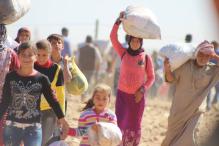The Permanent Missions of Kenya, Norway, the United States, and the United Arab Emirates, United Nations University Centre for Policy Research, UN Women, and the Peace Research Institute Oslo (PRIO), hosted an event on 3 February 2022 to advance the Women, Peace and Security agenda.
Over the last two decades since the adoption of resolution 1325 (2000), the Security Council has increasingly integrated language on Women, Peace, and Security (WPS) across its thematic and country-specific texts. This language has led to the creation and continuation of positions such as Women’s Protection Advisors and Gender Advisors in peace operations. It has mandated UN entities to promote and protect women’s rights and gender equality by implementing and advocating for their full, equal and meaningful participation in diverse conflict-affected contexts, and to support government and civil society efforts, including National Action Plans, in this regard. The Security Council itself has taken several steps to strengthen its own work on WPS, including the creation of the Informal Expert Group (IEG) and the practice of inviting civil society briefers to participate in its meetings.
In recent years, Security Council members and key stakeholders have considered progress made and next steps on WPS. Surrounding the twentieth anniversary of resolution 1325 (2000), the focus shifted from making progress at the norm-setting level to the need for implementation of the existing framework in order to ensure greater impact in conflict and post-conflict areas. In order to strengthen implementation, a strong understanding of the scope of use and application of Security Council language on WPS is essential.
The aim of this briefing was to spark exchange and facilitate a greater understanding of how the Security Council’s WPS language - in both country-specific and thematic resolutions - is implemented in the field. It not only served as a forum for discussion, but also provided the basis for future work to bring additional knowledge on the implementation of WPS language to the UN Headquarters context.
In this meeting, current and incoming Security Council members, UN agencies, civil society, and a small group of researchers working on WPS came together to discuss the connection between Security Council WPS language and WPS actions in the field, including the roles of Women’s Protection Advisors and Gender Advisors, women’s participation in political, peace, and security processes, and sanctions language and protection mandates on sexual and gender-based violence. It also sought to understand the impact that adjustments to language can have on implementation.
The questions guiding the briefing were:
- What role does WPS language in country-specific resolutions play for Member States, UN entities, and civil society and how do they use Security Council products to support their work in conflict-affected contexts?
- What are some concrete examples of when Security Council language has been most effective and best supported implementation of activities towards gender equality?
- What are the main UN activities and roles that are mandated through Security Council resolutions, and how are they affected by changes to language?
- How does Security Council language support civil society’s work on WPS?
- How has the creation of the Informal Expert Group (resolution 2242) impacted the utilization and implementation of WPS language in Security Council decisions?
- What emerging good practices exist for integrating WPS throughout Security Council members’ work?


